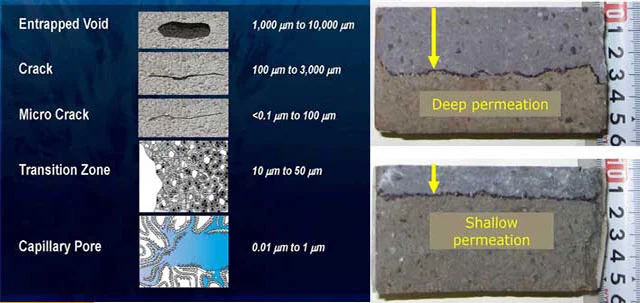Permeability is referred to the feature that regulates the rate of flow of a fluid into a penetrable solid.
Permeability of Concrete:
For performing hydration of cement about 38% of water by weight of cement is needed to fill the gel pores. If the water percentage exceeds 38%, then excessive water will result to unwanted capillary cavities and the concrete turns into porous. Porous concrete is of higher permeability.
Significance of Permeability:
In case of reinforced concrete, admission of water and air will result in corrosion of steel leading to extension, cracking and dislocation of concrete.
The permeability is very essential in case of liquid retaining structures such as water tanks and dams where water-stiffness is vital.
Factors affecting Permeability
The major factors affecting permeability are as follows:
- Water/ cement ratio
- Compaction and curing
- Properties of cement
- Aggregate
- Absorption and homogeneity of concrete
- Use of admixtures
- Age of concrete
We can see that each factor is evenly essential portrayed in the figure below. If any one of these factors is not controlled. It guides to intensification of permeability.

We can notice that the level of permeability is extended as the cement and water’s ratio is increased. Basically, at the cement and water ratio of approximately 0.4, permeability is basically 0.
According to the tests that were performed to resolve the outcome of superplasticisers on water permeability, 150 mm size cubes water stored for 30 days in lime- immersed water at 230C and then exposed to water pressure on one side.

